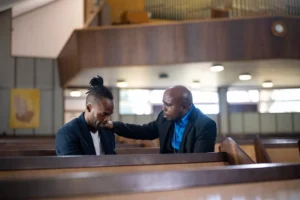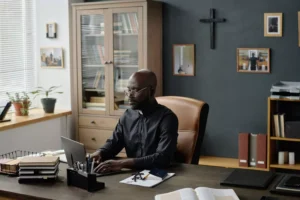“I think — you’re Professor Theophilus, aren’t you?”
I swung around at my desk. “Yes, come in.”
“You need a name plate for your door.”
“I had one, but it fell off. And you are — ?”
“Katie Burns. You don’t know me. I heard you speak at Forum last year, and I thought maybe you could give me some advice.”
“You’re forthright, aren’t you? About what?”
“Well, it’s like this,” she said. “At Forum you talked about how Christians reason. I grew up in a church where nobody reasoned. Everything was emotional. It all seems so baseless, and there are lots of things I resent. Even the people!”
“Why do you resent them?”
“I’m mad at them for making me scared when I was a kid. I’m mad at them for not giving me an intellectual basis for my faith — I can’t ‘reason like a Christian,’ and when I’m challenged, I don’t know what to say. And I’m mad at them for being so nosy and talking behind my back.”
“That sounds nasty. Were they all like that?”
“No. In fact most of them were kind and caring. But the few people who weren’t sort of spoiled it for me. I know I shouldn’t feel that way, but I do.”
“Tell me a little more about how they scared you.”
“They were always adding together numbers from different Bible verses, turning them into dates, and predicting disasters. One time when I was a kid, they got all worked up from reading some crazy book and said that the great tribulation was going to begin at precisely five o’clock on such-and-such a date and we’d better start stockpiling food. There was something about locusts and Russian helicopters, too.”
“Did everyone in the church believe these predictions?”
“Yes, even my Mom and Dad, and they’re pretty smart. One day when I got home from school Dad was digging a shelter in the basement. I was terrified.”
“But the great tribulation didn’t begin at precisely five o’clock on the day they predicted.”
“Right! And you know what? Nobody said a thing about it! Well, almost nobody.”
“Almost nobody?”
“A few people commented, ‘Well, maybe it will happen in the next 90 days.’ But by that time, they’d forgotten the whole thing! And after all the sleep they made me lose!”
“Was that the only time they made a false prediction?”
“How I wish! So-called prophesies were thrown here, there, and everywhere. I read in the Bible that when a prophesy turns out to be false, you shouldn’t listen to the so-called prophet any more. But in my church, false prophecies were just forgotten. Last night —”
“Go ahead.”
“Last night I saw a billboard in front of a church that said — oh, I don’t even want to tell you what it said. I got so angry I was beside myself. I’m still mad about it.”
” I see that.”
“And don’t even get me started on the Jesus-fish eats Darwin-fish bumper stickers. When I think of that one, I even scare myself.”
“What do you mean?”
“Well, the Darwinist stickers are just as offensive as the Christian ones, right? They insult a Christian symbol. But for some reason I don’t get angry about them. Does that mean I’m losing my faith?”
“I doubt it. You get angry about the Christian stickers because they’re ‘in the family.’ It’s always more embarrassing when your own little brother pees on the sidewalk than when someone else’s little brother does. Now. You said that you hoped I could give you some advice. What kind of advice are you looking for?”
“What do you think I should do? I don’t even know what I believe about the end times any more. I know I don’t want to be preoccupied by them. And I’m having a hard time forgiving these people.”
“I think then you’ll find it much easier to forgive them after you’ve settled into a new church. That’s the first step.”
“I know I’m never going back there. College gave me some distance.”
“Just make sure it isn’t the wrong kind of distance, Katie.”
“What do you mean?”
“Several things. For example, don’t let your memories of your old church become distorted by your anger. You mentioned that most of the people were kind and caring. A good spiritual exercise would be to thank God for their kindness and ask Him to forgive the others.”
“Well, yes. But the kind and caring ones didn’t do me much good either. I still don’t know how to ‘reason like a Christian,’ or how to give an intellectual defense of my faith.”
“Perhaps they gave you everything they could. They couldn’t teach you that because they hadn’t been taught either.”
“I hadn’t thought of it that way.”
“Another thing I mean when I mention the ‘wrong kind of distance’ is that the important thing isn’t just to leave the unsound church — it’s to find a sound one. We’re not made to go it alone.”
“God’s convicted me of that sin already. For a long time I wasn’t worshipping anywhere. Now I’m looking again.”
“What kind of church are you looking for?”
“I feel that I want to go someplace completely opposite.”
“I don’t blame you for feeling that way, but the feeling should probably be resisted.”
Katie was aghast. “You mean you think I should go to the same kind of church?”
“I didn’t say that. But it doesn’t make any sense to give up drinking water just because you came close to drowning once. People die of thirst too.”
“I don’t understand.”
“I just mean that the best way to avoid an extreme isn’t to go to the opposite extreme, but to find balance. In the desire to escape from eccentric and unbalanced interpretations of the Bible, you might be tempted to seek a ‘completely opposite’ church where people don’t believe in the Bible at all.”
“Oh-h-h.”
“Or, because you’ve been plagued by nosy gossipers, you might be tempted to seek a ‘completely opposite’ church where anyone can do as he pleases and no one even cares about anyone else.”
“Now I see what you mean.”
“Indulge me for one more illustration. Your old church was all heart and no mind. By way of compensation, you may be tempted to seek a ‘completely opposite’ church which is all mind and no heart.”
“So you’re saying if I’m not careful, the cure might be worse than the disease.”
“Exactly. You’ll have to watch out for another temptation, too.”
“Another one? How many are there?”
I laughed. “Only one more. You’ve already confessed a tendency to let a few bad apples spoil everything for you. But you know, all of us are sinful and obnoxious in some way or other. If it weren’t true, we wouldn’t need a Savior. You won’t ever find a church where everyone is perfectly good.”
“Now you’re making it sound like there’s no difference between healthy churches and unhealthy ones.”
“Not at all. It’s just that you shouldn’t judge the moral health of a church by whether people are perfect, but by whether they’re getting better.”
As Katie thought this over I kept my peace. When she spoke again, it was to shift the subject slightly.
“That’s helpful, Professor Theophilus. But there’s one thing that worries me. Like I said before, I don’t know how to ‘reason like a Christian.’ I need a church that will help me think better, not just live better.”
“That makes sense. So what’s the problem?”
“The problem is that I know so little about how to ‘reason like a Christian’ that I’m not sure I’d recognize a church like that if I found it.”
“I have two suggestions. Are you a reader?”
“I love to read.”
“Good! Then the first suggestion is to start reading the right things.” I gave her a short list of books on different subjects — on loving God with all your mind, on basic Christian belief and practice, and on how to read the Bible with understanding. “This one,” I told her, “will interest you because your old church was so anti-intellectual; this one, because it was so unbalanced; and this one, because it was so eccentric in its approach to the Bible.”
She wrote the titles in her notebook, then asked, “What’s the second suggestion?”
“Check out the new Student Christian Reading Fellowship.”
“Never heard of it.”
“I only know about it because I know the organizer, Mark Manasseh. Every two weeks the members read a great Christian classic, then meet to discuss it. Not a substitute for church – a supplement.” I gave her his email address.
After writing that down too, she looked up from her notebook. “This is really encouraging to me. I’ve seen people like me drop right out of Christian faith. I’m beginning to think I can actually grow in it.”
“Will you let me know how things work out?”
She smiled. “That I promise.”
Copyright 2001 J. Budziszewski. All rights reserved.









